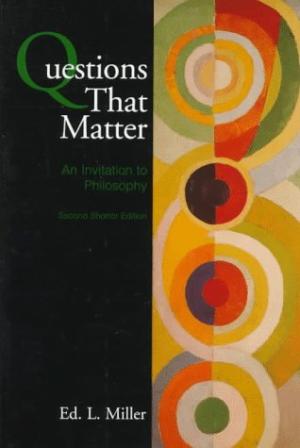Friday Philosophy from Thinker Ed L. Miller
On my Facebook and Twitter pages I have a weekly segment called #FridayPhilosophy, where I provide quotes from great philosophical thinkers. One philosopher I quote often is professor Ed L. Miller. Dr. Miller’s book Questions That Matter was the first philosophy textbook that I ever used in teaching philosophy and his writings significantly influenced my thinking on the subject.

Here is a brief biography of Miller, along with four of his provocative quotes on philosophy that I’ve used in my social media #FridayPhilosophy segment. I also elaborate on these nuggets of wisdom.
Who is Ed L. Miller?
Ed L. Miller holds dual doctorates in philosophy and theology. He served as both professor of philosophy and professor of religious studies at the University of Colorado Boulder, where he is now professor emeritus. He is a member of the American Academy of Religion, the Society of Christian Philosophers, and the Studiorum Novi Testamenti Societas. Miller has written a number of books in the fields of philosophy and religion.
1. On Defining Philosophy
- “Philosophy is the attempt to think rationally and critically about the most important questions.”1
I appreciate this definition of philosophy because it reveals (in a nutshell) that philosophy entails thinking hard about the things that matter most in life. Philosophy is therefore a robust activity that everyone can engage in. All people at some point ask the deep questions of life, and philosophy provides tools to attempt to answer these critical inquiries.
2. On Comparing Philosophical Activity
“Philosophical activity lies somewhere between that of the scientist and the poet.”2
The major fields of philosophy ask fundamental questions about reality (metaphysics), knowledge (epistemology), morals (ethics), values (value theory), rationality (logic), and beauty (aesthetics). It is certainly true that the disciplines overlap, but philosophy, in contrast to science, endeavors to ask and answer the big why questions of life over the what questions. Philosophy, as distinct from poetry, emphasizes the rational elements more than the imaginative or expressive aspects of truth.
3. On the Activity of Philosophy and Theology
- “It has been said that philosophy looks for a black cat in a dark room when no cat is there, but that theology finds the cat anyway.”3
This is, of course, an amusing comment about the alleged activity of the philosopher. But this statement is provocative in what it suggests. Looking for a black cat in a dark room is challenging enough, but think of the futility if the cat isn’t even there! On the other hand, if the cat represents God, then because of the noetic effects (sin negatively affects and undermines the human mind and intellect) of the fall on philosophers, God must take the initiative in specially revealing himself. Thus, the theologian, as the recipient of divine revelation, will find the cat.
4. On Defining a Worldview
- “The philosopher attempts to organize and systematize his or her encounters with existence and value, to articulate a Weltanschauung or “world view,” a general impression and judgment about the whole of things.”4
Thinking from a worldview perspective is important especially in philosophy. A worldview is a person’s big-picture view of reality. It includes a cluster of critical beliefs about such things as God, the world, knowledge, values, human beings, and history. Everyone has some perspective or take on things as a whole. Formal and popular worldviews would include theism, naturalism, and Eastern mysticism.
As a young philosophy teacher I was fortunate to discover Miller’s introduction to philosophy textbook, Questions That Matter. Miller’s book provides a clear and sophisticated understanding of philosophy overall as well as the topic of philosophy of religion, which includes thinking about God. If you want to grow in your understanding of philosophy, especially as a Christian, check out Miller’s textbook.
Reflections: Your Turn
How often do you reflect on the big philosophical questions of life? Visit Reflections on WordPress to comment with your response.
Check out more from Reasons to Believe @Reasons.org
Endnotes
- Ed L. Miller, Questions That Matter: An Invitation to Philosophy, 4th ed. (New York: McGraw-Hill, 1996), 15.
- Ed L. Miller, God and Reason: An Invitation to Philosophical Theology, 2nd ed. (Upper Saddle River, NJ: Prentice Hall, 1995), 3.
- Miller, God and Reason, vi.
- Miller, God and Reason, 3.





